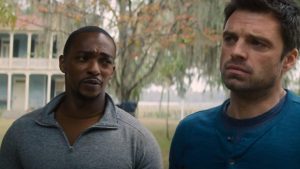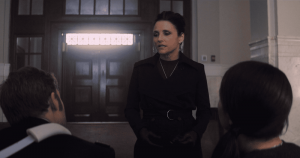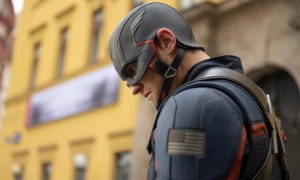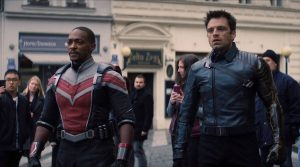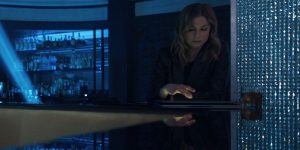Michaela Coel is on a meteoric rise to stardom, and it’s been a beautiful thing to witness. Over roughly five years, the British-Ghanaian actress has gone from a fleeting appearance in The Last Jedi to starring in an episode of Black Mirror and in the TV series Chewing Gum, which she wrote and produced. But until last year, she was still relatively unknown – and then I May Destroy You came along, earning Coel three Emmy Award nominations for her work in front of and behind the camera as an actress, writer, director, and producer. I’m sure Marvel President Kevin Feige had his eye on her even before she joined WandaVision‘s Elizabeth Olsen in the Emmy’s Best Actress category, but just yesterday it became official: Coel is joining the MCU.
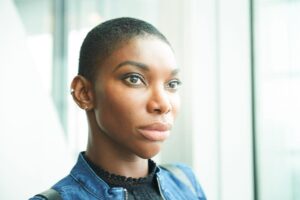
She’ll be showing up in the sequel to Black Panther, titled Wakanda Forever, and has apparently already joined director Ryan Coogler and her castmates in Atlanta to start filming. That’s really all we know for the time being, because her role is being kept under wraps, but speculation has been…intense, to say the least. Why? Because thanks to her extraordinary talent and the fact that she happens to possess the most sculptured cheekbones in all of England, she’s one of the top fan-casts for the character of Ororo Munroe, a.k.a. Storm.
Yeah, as in the Storm. The Storm whose been one of the most prominent members of the X-Men team in Marvel Comics since 1975. The Storm whose an Omega-Level Mutant with pretty much every atmokinetic ability under the sun (the light of which she can manipulate by altering levels of moisture in the air, by the way), including the power to generate wind, rain, lightning, thunder, snow, hurricanes, tornadoes, fog, etc. The Storm who appeared in six of Fox’s X-Men movies played by Halle Berry and Alexandra Shipp, and who got virtually nothing to do in all that time. It is long past time for Storm to get some of the spotlight that’s been reserved for her (white, male) teammates, and Michaela Coel in the role would ensure an unforgettable MCU debut for the character.
And unlike, say, Reed Richards or Blue Marvel appearing in WandaVision, Ororo Munroe showing up in a Black Panther story would make sense. The character’s connections to Wakanda date back to her first interaction with the African nation’s king, T’Challa, whom she met and rescued back when he was still a prince. The two formed a close (and semi-romantic) bond while journeying together, but separated before they could express their feelings for each other, with T’Challa going on to become king of Wakanda and Munroe settling down in her ancestral homeland on the Serengeti, where she was worshipped as a goddess. Since then, in the comics, she’s married T’Challa, served as the Queen of Wakanda for a time, left T’Challa to side with the X-Men, defended Wakanda from a number of threats including Skrull shapeshifters, and taken over as its Queen during T’Challa’s absence.
But in the MCU, T’Challa isn’t coming back following Chadwick Boseman’s tragic passing last year. There’s been a lot of debate over whether it’s the right choice and how Marvel will incorporate Boseman’s death into the story of Wakanda Forever, but ultimately it seems a different character (or perhaps, characters) will take up the Black Panther mantle – one likely being Shuri, T’Challa’s younger sister, and another candidate being M’Baku of the Jabari Tribe. I don’t expect Storm to vie for the mantle, but I could envision a scenario where she’s introduced at the beginning of the movie as one of T’Challa’s friends from childhood, who never got the chance to say goodbye to him before what will presumably be an in-universe funeral for the character.

There would be pros and cons to this, of course. It could serve as a very touching opportunity to explore more of T’Challa’s youth, and I’m sure many audiences would see themselves in Storm’s grief and feelings of incompletion. But at the same time…it might be unfair to both the character of Storm and the legacy of Chadwick Boseman to use this movie as a means of introducing other major characters, if it distracts from giving Boseman the send-off he deserves. It could also be unfair to Michaela Coel, who never worked with Boseman and can’t draw on the same genuine feelings of heartbreak that his Black Panther castmates like Lupita Nyong’o, Letitia Wright, and Winston Duke, can. If anyone could make this work, it’d be Ryan Coogler, but it’s going to be a tricky situation regardless.
But of course, we don’t actually know that Michaela Coel is playing Storm in Wakanda Forever, and there’s a good chance she’s not. My only hope is that she’s not in a one-off role, because Coel deserves to stick around in the MCU no matter who she’s playing.
And if not Storm, what then? Well, there’s a few other options I’ve seen floated, all of which could potentially be interesting. For instance, Michaela Coel would make for a radiant Madam Slay, a minor villain from the comics who controls an army of leopards and is mostly content with hunting and killing poachers until she crosses paths with Erik Killmonger, becomes his lover, and tries to usurp the throne of Wakanda with him. In the MCU, Madam Slay could show up in Wakanda to avenge Killmonger’s death at the end of Black Panther, although that could turn into a retread of Killmonger’s own character arc.
A lesser-known but perhaps even more interesting character is Zenzi, a villainous empath who can force people to succumb to their darkest desires and worst impulses. In the comics, she’s not technically Wakandan but does become an ally of a Wakandan rebel movement who seek to overthrow T’Challa. In the MCU, her origin story could be tweaked a little: she could lead a rebellion against whoever is chosen to become the new Black Panther. Interestingly, Zenzi has a connection to Baron Zemo which the MCU might like to exploit – I don’t know about you, but I’d love to see Michaela Coel join the Thunderbolts.
Coel may not want to play a villain, however, in which case she’d also be a great choice to play Aneka, one of the Dora Milaje warriors from the comics who hasn’t appeared yet in live-action – but whose canonical girlfriend, Ayo, was prominently featured in The Falcon And The Winter Soldier just recently. Not only would it be great to have more LGBTQ+ representation (particularly queer Black women) in the MCU, but this is a role Michaela Coel could easily reprise in the upcoming Wakanda-centric Disney+ series. In fact, she could lead the Wakanda-centric Disney+ series, not to mention write and direct parts of it too.
As you can see, there’s a lot of great characters besides Storm whom Michaela Coel could play, and I’d be happy with any one of these choices because I really just want Coel to shine. But if she is playing Storm, and she is the very first Mutant introduced in the MCU, you definitely won’t see me complaining because I’ve wanted her in that role for a while now.
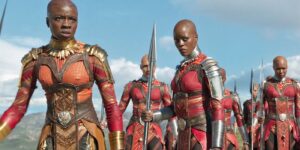
How about you? Do you want to see Michaela Coel don Ororo Munroe’s classic white hair and take to the skies, or would you prefer her in a different role? Share your own thoughts, theories, and opinions, in the comments below!

